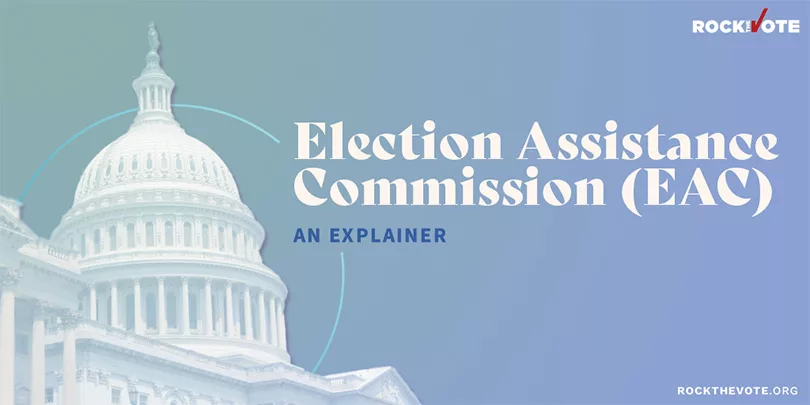
What is the Election Assistance Commission?
The Election Assistance Commission, or (EAC), is an independent, bipartisan commission dedicated to helping Americans vote by making sure election officials have the support and resources they need. It is the only federal agency charged with improving voting systems and helping states with other critical functions of election administration.
Established in 2002 by the Help America Vote Act (HAVA), in part in response to the voting equipment and election failures that led to the controversial outcome of the 2000 Presidential Election. The Commission, created under the Bush Administration, works to ensure that all principles established by HAVA are being followed, through the creation of guidelines, toolkits, audits, testing, and more.
The EAC is composed of four commissioners and works in partnership with state and local election divisions and several advisory committees, including the Standards Board, the Board of Advisors, and the Technical Guidelines Development Committee.
What does the EAC do?
The EAC is tasked with many different responsibilities to ensure that elections run smoothly. As the only federal agency charged with improving elections and voting, some of its responsibilities include:
- Ensuring that every eligible American has the opportunity to vote independently, privately, and with confidence in the election system
- Setting standards for voting systems, including the Voluntary Voting Systems Guidelines, which are the guidelines used for testing voting machines
- Ensuring voting machines run properly and securely and that they meet accessibility requirements
- Tracking and correcting problems with voting systems
- Researching and election management and improvement
- Administering a national clearinghouse on elections that involves shared practices, information for voters, and other resources for public use
- Creating helpful guidelines, including best practices on election administration for poll workers and election officials
- Maintaining the National Mail Voter Registration Form
- Distributing and auditing the funds granted by HAVA to make sure proper usage
- Conducting public meetings and hearings to provide voters information on U.S. elections
Who runs the EAC? Are they elected?
Many state chief election officials are elected, and state election administrations can be partisan. The EAC ensures that our country’s election standards are outlined by both major political parties, and new voting systems, including the machines that we vote on, are approved and certified. To ensure bipartisanship, the EAC’s four commissioners are equally split — two Democrats and two Republicans. Commissioners may hold that position for up to two consecutive terms.
The majority and minority leaders of both chambers of Congress make candidate recommendations to the President. The President nominates a candidate who must then be confirmed by the Senate.
Why is the EAC so important?
As the only federal commission or agency dedicated to election administration, the EAC is extremely important to ensure free, fair, and secure elections across the country. Without the EAC, we would not have any federal oversight of election administration.
Take voting equipment, for example. The EAC’s voting equipment security standards are designed to mitigate foreign and domestic election interference as well as increase the cyber security of our elections. States relying on the EAC’s standards and testing of voting equipment would no longer have guidance or the ability to test voting equipment, thus compromising election security. This is just one of many examples of the critical function provided by the EAC.
In 2017, during the Trump Administration, the House Administration Committee approved a bill to terminate the Election Assistance Commission, which spurred civic groups and government officials to speak out in opposition. While the effort to terminate the EAC ultimately proved unsuccessful, dangerous attempts to weaken federal oversight is a threat we must continue to monitor by those who seek to weaken our democracy.
Published December 19, 2022.
